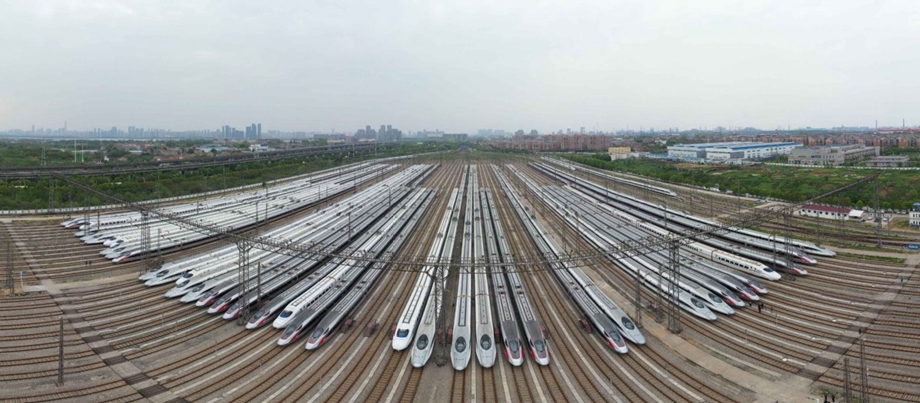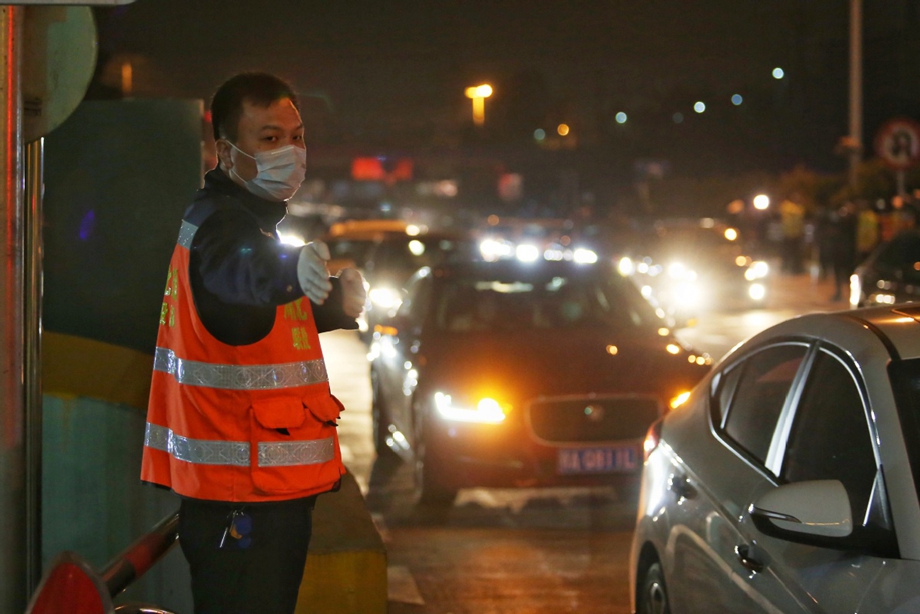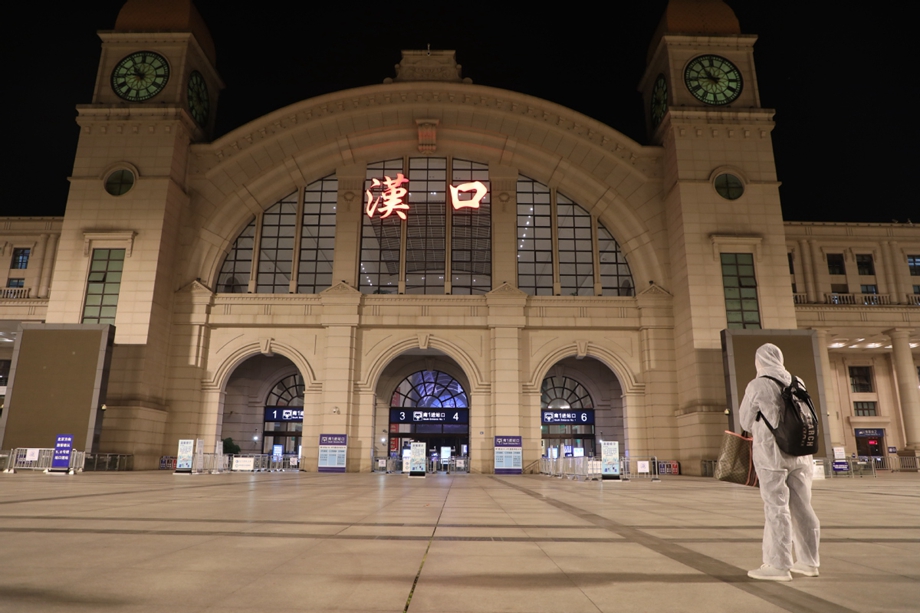
High-speed trains await the resumption of operations in Wuhan, Hubei province, on Monday. The 76-day lockdown of the city ends on Wednesday. ZHAO JUN/FOR CHINA DAILY
People's lives, safety, health prioritized in war on COVID-19
Ending the lockdown of Wuhan, Hubei province, on Wednesday will become a milestone for China in securing final victory in the people's war against the COVID-19 outbreak under the command of President Xi Jinping, observers said.
The decisive measures that the Communist Party of China Central Committee-with Xi as its general secretary-have taken to help Wuhan fight the epidemic held the key to curbing the spread of the novel coronavirus in what was the hardest-hit city, as well as in the province and in the entire country, they said.
A constant theme has been "people first" in the fight against the contagion as Xi has stressed putting people's lives, safety and health as the top priority and placing the people's interests above everything else.
In his meeting with World Health Organization Director-General Tedros Adhanom Ghebreyesus on Jan 28 in Beijing, Xi said people's safety and their health always come first.
Recounting his experience of leading World Health Organization experts on a nine-day joint mission investigating COVID-19 in China, Canadian epidemiologist Bruce Aylward commended China's approaches in responding to the disease.
"If I had COVID-19, I'd want to be treated in China," he said. "They know and they care about keeping people alive, and they do it successfully."
While masterminding the epidemic prevention and control efforts, Xi gave Hubei, particularly Wuhan, the provincial capital, priority. He said that "when Wuhan wins, Hubei wins; when Hubei wins, China wins".
Therefore, since the start of the outbreak, the CPC Central Committee has taken the most comprehensive, thorough and rigorous measures to resolutely curb the spread of the virus in Wuhan and Hubei.
As experts recommended quarantine measures to help reduce population movement, which in turn helped to stem the spread of the virus, the CPC Central Committee made the decision on Jan 22 to ask Hubei to stop outbound travel to prevent the disease from spreading in other regions.
Xi said at a meeting in February that making such a decision demands tremendous political courage, but "time calls for resolute action, otherwise, we would be in trouble".
On Jan 23, the authorities in Wuhan announced the lockdown of the city. All public transportation and businesses were suspended, and residents were required to stay indoors to cut transmission in neighborhoods.
Putting such a huge city with over 10 million residents under quarantine was unprecedented but has proved to be effective. During his visit to Wuhan on March 10, Xi said all prevention and control measures adopted by the CPC Central Committee focus on preventing more people from being infected and are aimed at saving more patients' lives.

An employee instructs vehicles to leave Wuhan on April 8, 2020. [Photo by Chen Liang/Chinadaily.com.cn]
Under Xi's command, a central leading group on epidemic response headed by Premier Li Keqiang was established on Jan 25. Two days later, a central group led by Vice-Premier Sun Chunlan was sent to oversee work in Hubei and has been stationed there ever since.
In early February, the Party secretaries of Hubei and Wuhan were replaced in light of the problems exposed in the initial response to the outbreak.
Epidemic response was on the agenda of a series of Party leadership meetings Xi has presided over since early January, including eight meetings of the Standing Committee of the Political Bureau of the CPC Central Committee.
At the meetings, he frequently underlined the importance of adopting the approach of early detection, reporting, isolation and treatment in epidemic control, and urged redoubled efforts to improve the admission and recovery rates and to reduce the infection and mortality rates.
Helal Helal, deputy general secretary of the Arab Ba'ath Socialist Party of Syria, said that the great achievements China has made in the fight against the outbreak speak volumes about the people-centered philosophy embedded in traditional Chinese culture.
In a message to the recent Asian Political Parties Online Conference, the Syrian party official said what China has done constitutes a great contribution to maintaining a life with dignity for all humanity.
To leave no COVID-19 patient unattended, Wuhan built two hospitals-Huoshenshan and Leishenshan-literally from scratch in about two weeks. Each had more than 1,000 beds. It also established 16 makeshift hospitals converted from sports stadiums and exhibition halls.

A man stands at the Hankou Railway Station in Wuhan on April 7, 2020. [Photo by Chen Zhuo/Chinadaily.com.cn]
Chen Weiguo, president of the State-owned China Construction Third Engineering Bureau Co, said building the hospitals in such a short time sounded like a mission impossible, but his company created a miracle.
More than 34,000 employees from around China worked around the clock, and they raced against time to build the hospitals in order to get more patients treated, Chen said.
Over 340 medical teams consisting of over 42,600 medical workers from across the country, rushed to the hardest-hit city at the call of the central government. That number included at least 4,000 medical staff from the People's Liberation Army.
Wang Xinghuan, president of Leishenshan Hospital, said 3,202 medical workers from 286 hospitals from across the country gathered in the medical facility to help treat the critically ill patients.
"We all have the same goal, saving more lives and helping more patients recover from the illness," Wang said, adding more than 1,000 volunteers and a great number of State-owned and private companies offered their services to ensure the hospital operated well.
Nineteen provinces formed partnerships with 16 cities and counties in Hubei to help them where medical resources were overstretched, a usual practice China follows in mobilizing nationwide resources for disaster relief.
When Xi flew to Wuhan on an inspection tour on March 10, he expressed his respect for medical workers, military officers and soldiers, community workers, police officers, officials, volunteers and people from all walks of life who have been fighting the epidemic on the front line. He expressed sympathy to patients and their relatives, as well as the families of those who died of the disease and those who died on duty.
While stressing that medical treatment should be given the top priority to improve the recovery rate and reduce mortality to the greatest extent through scientific and targeted treatment, he demanded more understanding and tolerance for people in Hubei and Wuhan if some vented their frustrations after being under self-quarantine for a long time, as well as efforts to ensure the supply of their life necessities.
Chen Feng, a 75-year-old resident of Songtaoyuan community in Wuhan's Wuchang district, said he appreciated Xi's personal care for people's sufferings as well as his strong leadership in the people's war on the epidemic.
"President Xi's visit to Wuhan took place at a critical time in the fight against the virus. His visit boosted our confidence in securing victory," Chen said.
Thanks to the stringent prevention and control measures, the situation in Wuhan keeps improving. Ma Xiaowei, minister of the National Health Commission, said at a news conference on March 31 that the domestic spread of the virus, with Wuhan being the main battlefield, has been "basically blocked" and epidemic control efforts have produced significant results.
Zhang Wenhong, director of the infectious disease department of Shanghai Huashan Hospital, told China Central Television that it is an unprecedented, remarkable achievement that a country can contain the pandemic in around two to four months. "All the nation, people and medical workers have done their utmost to curb the epidemic," Zhang said.
The risk of imported infections remains high, so vigilance is still highly needed to prevent the disease from going viral again, he said, adding that he is confident the country will fully win the battle against the virus.
|








7740f3b5-9ecb-438e-9052-76cb2d4bb671.jpg)

